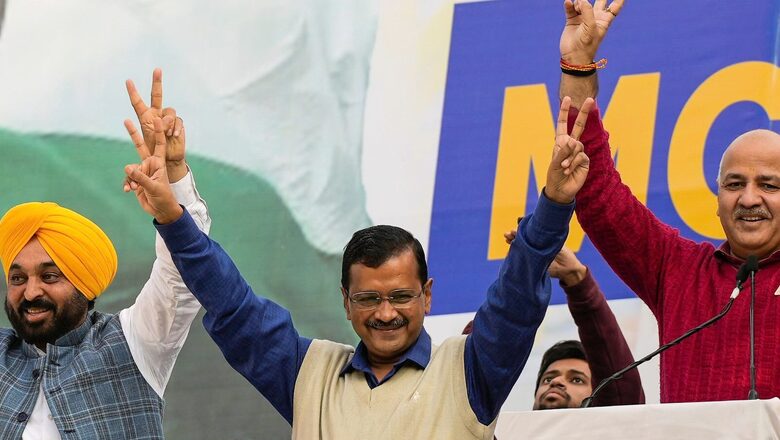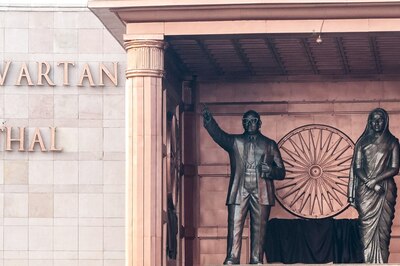
views
It has been an extraordinary year for the Aam Aadmi Party (AAP). It had a landslide victory in the Punjab polls in the first half of 2022, and by the end of the year had emerged as the single largest party in the Municipal Corporation of Delhi (MCD) elections that dethroned the BJP from its 15-year-long rule in the civic body, gained 12.9% vote share in the Gujarat polls, and declared a “national” party.
AAP in 2022 has reaped the rewards of its 10 years of work altogether, say party leaders, and now the stage is set for the next, as 2023 is going to be an “action-packed” year with major plans of expanding its national footprint, beginning from states that are due for assembly elections — Rajasthan, Chhattisgarh, Madhya Pradesh, Karnataka and Telangana, apart from north-east states Tripura, Mizoram, Meghalaya, and Nagaland.
Even for party insiders, the wins, one after the other, were not so expected. AAP, riding on the massive popularity of Bhagwant Mann and the anti-incumbency of the ruling Congress in Punjab, had set out for a win. But that it turned out to be historic, as AAP landed 92 seats in the 117-member assembly, was something the party had not exactly thought of.
Then came the MCD polls, a desperately awaited election by AAP, which had been running a campaign against the Bharatiya Janata Party (BJP) for the past three years knowing that it would register a win here. AAP got 134 out of the 250 wards, and despite anti-incumbency, the BJP managed to get 104. The saffron party had not expected to get more than a double-digit figure in the civic polls. Yet AAP with its promise to clean the city and offer a solution to its huge solid waste management problem seems prepared to hold onto its newly acquired power.
All this happened amidst the central investigation agencies conducting raids at AAP leaders’ houses in one case or the other with rivals branding as “corrupt” a party that first came to power in 2013, and then in 2015, on the back of a strong anti-corruption movement. Senior AAP leader and Delhi’s health and home minister Satyendar Jain was arrested by the Enforcement Directorate (ED) on May 30. In August, the CBI raided deputy chief minister Manish Sisodia’s residence, who was later named as one of the 15 accused in its FIR into the alleged irregularities in the Delhi excise policy 2021-22.
Meanwhile, AAP lay low and shifted the focus, continuing a spirited campaign centred on its “Delhi model” in poll-bound Gujarat. The campaign led by the party’s national convener Arvind Kejriwal and other top leaders was hard to miss for both its opponents and the people. AAP during electioneering comfortably filled the vacuum of an energetic opposition in the state, which was left open by a more or less inactive Congress.
Akshay Marathe, AAP’s national spokesperson, calling the year “historic” and “revealing” for the party, said that suddenly after the Punjab win there were spurts of curiosity sparked by it that a fairly new party can win in a state other than the one where it has originated.
“Till the Punjab polls, there was this duopoly of the BJP and Congress as the major parties in most states, which was broken by AAP. The party proved that it has a message and an alternative model of governance for the people. To get national status within 10 years of its journey is a big feat and we are going to celebrate as well as take it further. We have a set platform now and are well-poised to fight elections in all the states due for polls in 2023,” said Marathe.
He added that 50% of the time the state “prabharis” (in-charges) are in their respective states where the work for cadre-building is ongoing.
When pointed out that AAP is seen as a one-man party by many, Marathe said that it could be a perception because it’s a relatively new party and leaders’ faces are not that established. But, if looked at closely, one should see that party’s chief convener Kejriwal has always promoted the second line of leadership, be it the case of Punjab chief minister Mann or Gujarat’s CM face Isudan Gadhvi, he said. “Also, it’s the only party that has provided fresh leadership in Delhi where most of its leaders have come from non-political backgrounds,” he added.
AAP in its national council meeting held on December 18, the first such meet after it was declared a national party, formulated a strategy for its expansion across the country. “The national council resolved to advance the work of organisation-building at the national level in the next six months. In the first phase, the work of nationwide organisation expansion will be carried out on priority basis in states with upcoming assembly elections,” the party’s Delhi convener Gopal Rai had said in a statement.
Also, AAP has appointed its senior leader and Rajya Sabha lawmaker Sandeep Pathak as the general secretary (organisation), a post created only this year, meant to look after the expansion operations.
Party functionaries said that the expansion has been in progress over the past two years. After the 2021 Surat municipal polls in which the party got 20 seats, it made its way to Guwahati where it won two municipal wards, MP’s Singrauli mayor is an AAP leader, and in Goa it has two MLAs.
“This has been a big year of achievements. There were apprehensions that AAP will be limited to being a state party; it has shown its credibility by winning different elections in different states. Next year is going to be action-packed with state polls, preparations for which are already underway. Even in Jammu and Kashmir, we are in the news almost every day. And we will also show in the new year, how Delhi can be cleaned with scientific models to deal with waste,” said AAP MLA and spokesperson Saurabh Bhardwaj.
Read all the Latest Politics News here



















Comments
0 comment